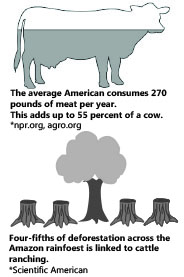Meat industry causes negative impacts
More stories from Ellen Garrett
For some, vegetarianism is seen as saving the lives of animals. For others, vegetarianism is seen as expensive, unhealthy and hurtful to the meat industry. Either way, according to People for the Ethical Treatment of Animals (PETA) the meat industry causes over 51 percent of greenhouse gas emissions. A global shift towards vegetarianism/veganism is necessary for combating global warming and the other environmental impacts of meat production.
Global warming is not the only problem that meat production feeds into. According to PETA, it takes 2,400 gallons of water to produce one pound of beef. By going vegan or even vegetarian, one person can save about 219,000 gallons of water per year. If the entire population of Newton went vegetarian, it would save over four billion gallons of water annually. According to science.time.com, the meat industry uses one-third of the world’s freshwater supply.
Water usage and global warming are only the tip of the iceberg. According to time.com, 30 percent of the world’s ice-free surface is used to house cattle, poultry and pigs. The majority of the additional land is used to feed those livestock. According to PETA, it takes 20 times less land than what is currently used for livestock to support a vegan lifestyle. Our meat consumption habits also cause deforestation. According to Scientific American, four-fifths of deforestation across the Amazon rainforest can be linked to cattle ranching.

These huge environmental concerns caused by producing meat not only affect our land, they also affect our oceans. This takes form in not only overfishing, but coral reef destruction and maintaining factory farmed fish. Factory farmed fish are carnivorous, this enhances overfishing because it takes three to six pounds of fish meal to create one pound of farmed salmon according to BeWell.com.
Going vegetarian or even just eating less meat in general can go a long way. If going vegetarian or cutting back is not a viable option, even just choosing organic, pasture-raised, grass-fed meat and dairy products can go a long way towards helping the environment.










